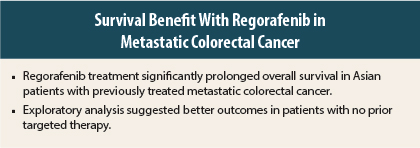In a phase III trial (CONCUR) reported in The Lancet Oncology, Jin Li, MD, and colleagues found that the multikinase inhibitor regorafenib (Stivarga) improved overall survival vs placebo in Asian patients with previously treated metastatic colorectal cancer.1
Regorafenib is approved in the United States for treatment of patients with metastatic colorectal cancer previously treated with fluoropyrimidine-, oxaliplatin-, and irinotecan-based chemotherapy, an anti-VEGF (vascular endothelial growth factor) therapy, and, if KRAS wild type, an anti-EGFR (epidermal growth factor receptor) therapy. In the phase III CORRECT trial that supported regorafenib’s approval, 111 of 760 patients were Asian, with most being Japanese.
Study Details
In this double-blind trial, 204 patients with progressive disease from 25 hospitals in mainland China, Hong Kong, South Korea, Taiwan, and Vietnam were randomized 2:1 between April 2012 and February 2013 to receive oral regorafenib 160 mg/d (n = 136) or placebo (n = 68) on days 1 to 21 of 28-day cycles. Both groups received best supportive care.
Patients had to have received at least two previous treatment lines, including a fluoropyrimidine plus oxaliplatin or irinotecan. Previous treatment with bevacizumab (Avastin), cetuximab (Erbitux), or panitumumab (Vectibix) was allowed but not mandatory. The primary endpoint was overall survival.
The regorafenib and placebo groups were generally balanced for age (median 58 and 56 years), region (China for 82% and 88%), Eastern Cooperative Oncology Group performance status, main site of disease, presence of KRAS mutation (yes in 34% and 26%, no in 37% and 43%, unknown in 29% and 31%), presence of BRAF mutation (yes in 0% and 1%, no in 21% in both, unknown in 79% and 78%), time from metastatic diagnosis (median 20 months in both), multiple metastatic sites, and previous systemic treatments. Previous targeted treatment included none in 41% and 38% of patients, anti-VEGF or anti-EGFR therapy in 59% and 62%, anti-VEGF but not anti-EGFR therapy in 24% and 19%, anti-EGFR but not anti-VEGF therapy in 18% and 25%, and both in 18%.
Improved Overall Survival
After a median follow-up of 7.4 months, median overall survival was 8.8 months (95% confidence interval [CI] = 7.3–9.8 months) in the regorafenib group vs 6.3 months (95% CI = 4.8–7.6 months) in the placebo group (hazard ratio [HR] = 0.55, P = .00016). Median progression-free survival was 3.2 months (95% CI = 2.0–3.7 months) vs 1.7 months (95% CI = 1.6–1.8 months (HR = 0.31, P < .0001).
Subgroup analysis showed a consistent effect of regorafenib in almost all subgroups. In an exploratory analysis of the effect of previous targeted biologic treatment, the hazard ratio for overall survival was 0.31 (95% CI = 0.19–0.53) among 82 patients with no prior treatment and 0.78 (95% CI = 0.51–1.19) among 122 who had received at least one targeted agent.
An additional exploratory analysis of overall survival with censoring at the start of post-study treatment showed hazard ratios of 0.57 (95% CI = 0.32–1.02) in patients with prior targeted treatment and 0.27 (95% CI = 0.15–0.49) in those with no prior treatment. After disease progression, 31% of patients in the regorafenib group and 43% of the placebo group received additional systemic treatment.
Objective response rates were 4% in the regorafenib group and 0% in the placebo group (P = .045), and disease control rates were 51% vs 7% (P < .0001).
Adverse Events
Drug-related adverse events of any grade occurred in 97% of the regorafenib group and 46% of the placebo group, with the most common in the regorafenib group being hand-foot skin reaction (73% vs 4%) and hyperbilirubinemia (36% vs 7%). Grade ≥ 3 drug-related adverse events occurred in 55% vs 14%, with the most common being hand-foot skin reaction (16% vs 0%), hypertension (11% vs 3%), hyperbilirubinemia (7% vs 1%), hypophosphatemia (7% vs 0%), and increased alanine transaminase (7% vs 0%) and aspartate transaminase levels (6% vs 0%).
Drug-related serious adverse events occurred in 9% vs 4%. Adverse events led to treatment interruption or dose reduction in 71% vs 16%, most commonly due to hand-foot syndrome and laboratory events in the regorafenib group, and to treatment discontinuation in 14% vs 6%, most commonly due to laboratory events in the regorafenib group (hand-foot skin reaction in 1%).
The investigators concluded: “This phase III trial is the second to show an overall survival benefit with regorafenib compared with placebo in patients with treatment-refractory metastatic colorectal cancer, substantiating the role of regorafenib as an important treatment option for patients whose disease has progressed after standard treatments. In this trial, preceding standard treatments did not necessarily include targeted treatments. Adverse events were generally consistent with the known safety profile of regorafenib in this setting.” ■
Disclosure: The study was funded by Bayer HealthCare Pharmaceuticals. For full disclosures of the study authors, visit www.thelancet.com.
Reference
1. Li J, Qin S, Xu R, et al: Regorafenib plus best supportive care versus placebo plus best supportive care in Asian patients with previously treated metastatic colorectal cancer (CONCUR): A randomised, double-blind, placebo-controlled, phase 3 trial. Lancet Oncol. May 13, 2015 (early release online).



